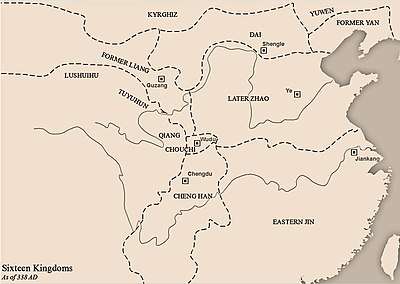Former Liang
| Former Liang (前涼) 西平, 涼 | |||||||||
|---|---|---|---|---|---|---|---|---|---|
| 320–376 | |||||||||
 Former Liang in the northwest | |||||||||
| Status | Vassal of Jin Dynasty (265-420), Han Zhao, Later Zhao, Former Qin | ||||||||
| Capital | Guzang | ||||||||
| Government | Monarchy | ||||||||
| Prince | |||||||||
• 320-324 | Zhang Mao | ||||||||
• 324-346 | Zhang Jun | ||||||||
• 346-353 | Zhang Chonghua | ||||||||
• 353-355 | Zhang Zuo | ||||||||
• 355-363 | Zhang Xuanjing | ||||||||
• 364-376 | Zhang Tianxi | ||||||||
| History | |||||||||
• Zhang Gui's creation as Duke of Xiping | 4 March 314[1][2] | ||||||||
• Zhang Mao's issuance of general pardon, usually viewed as establishment | 320 320 | ||||||||
• Zhang Mao's acceptance of Prince of Liang title | 323 | ||||||||
• Zhang Zuo's formal rejection of Jin suzerainty | 354 | ||||||||
• Zhang Xuanjing's formal acceptance of Jin suzerainty | 361 | ||||||||
• Disestablished | 26 September 376[3][4] 376 | ||||||||
• Zhang Tianxi's death | 406 | ||||||||
| Currency | Chinese coin, Chinese cash (Wu Zhu) | ||||||||
| |||||||||
The Former Liang (Chinese: 前涼; pinyin: Qián Liáng; 320–376) was a state of the Sixteen Kingdoms during the Jin dynasty (265–420) in China. It was founded by the Zhang family of the Han Chinese. Its territories included present-day Gansu and parts of Ningxia, Shaanxi, Qinghai and Xinjiang.
All rulers of the Former Liang remained largely titularly under the court of the Jin dynasty as the Duke of Xiping except Zhang Zuo who proclaimed himself wang (prince/king). However, at times the other Former Liang rulers also used the wang title when imposed on them when they were forced to submit to Han Zhao, Later Zhao, or Former Qin.
In 327, the Gaochang commandery was created by the Former Liang under the Han Chinese ruler Zhang Gui. After this, significant Han Chinese settlement occurred in Gaochang, a major, large part of the population becoming Chinese. In 383 The General Lu Guang of the Former Qin seized control of the region.[5]
Rulers of the Former Liang
| Temple names | Posthumous names | Family names and given name | Durations of reigns | Era names and their according durations |
|---|---|---|---|---|
| Chinese convention: use family and given names | ||||
| Did not exist | Ming (明 Míng) | Zhang Shi (張寔 Zhāng Shí) | 314-320 | Jianxing (建興 Jiànxīng) 314–320 |
| Did not exist | Cheng (成 Chéng) | Zhang Mao (張茂 Zhāng Mào) | 320–324 | Jianxing (建興 Jiànxīng) 320–324 |
| Did not exist | Zhongcheng (忠成 Zhōngchéng) | Zhang Jun (張駿 Zhāng Jùn) | 324-346 | Jianxing (建興 Jiànxīng) 324-346 |
| Did not exist | Huan (桓 Huán) | Zhang Chonghua (張重華 Zhāng Chónghuá) | 346-353 | Jianxing (建興 Jiànxīng) 346-353 |
| Did not exist | Ai (哀 āi) | Zhang Yaoling (張曜靈 Zhāng Yàolíng) | 3 months (the ninth to the twelfth month) in 353 | Jianxing (建興 Jiànxīng) 353 |
| Did not exist | King Wei (威王 Wēi Wáng) | Zhang Zuo (張祚 Zhāng Zuò) | 353-355 | Jianxing (建興 Jiànxīng) 353-354 Heping (和平 Hépíng) 354-355 |
| Did not exist | Jingdao (敬悼 Jìngdào) or Chong (沖 Chōng) | Zhang Xuanjing (張玄靚 Zhāng Xuánjìng) | 355-363 | Jianxing (建興 Jiànxīng) 355-361 Shengping (升平 Shēngpíng) 361-363 |
| Did not exist | Dao (悼 Dào) | Zhang Tianxi (張天錫 Zhāng Tiānxí) | 364-376 | Shengping (升平 Shēngpíng) 364-376 |
Rulers family tree
| Former Liang rulers family tree | ||||||||||||||||||||||||||||||||||||||||||||||||||||||||||||||||||||||||||||||||||||||||||||||||||||||||||||||||||||||||||||||||||||||||||||||||||||||||||||||||||||||||||||||||||||||||||||||||||||||||||||||
|---|---|---|---|---|---|---|---|---|---|---|---|---|---|---|---|---|---|---|---|---|---|---|---|---|---|---|---|---|---|---|---|---|---|---|---|---|---|---|---|---|---|---|---|---|---|---|---|---|---|---|---|---|---|---|---|---|---|---|---|---|---|---|---|---|---|---|---|---|---|---|---|---|---|---|---|---|---|---|---|---|---|---|---|---|---|---|---|---|---|---|---|---|---|---|---|---|---|---|---|---|---|---|---|---|---|---|---|---|---|---|---|---|---|---|---|---|---|---|---|---|---|---|---|---|---|---|---|---|---|---|---|---|---|---|---|---|---|---|---|---|---|---|---|---|---|---|---|---|---|---|---|---|---|---|---|---|---|---|---|---|---|---|---|---|---|---|---|---|---|---|---|---|---|---|---|---|---|---|---|---|---|---|---|---|---|---|---|---|---|---|---|---|---|---|---|---|---|---|---|---|---|---|---|---|---|---|
| ||||||||||||||||||||||||||||||||||||||||||||||||||||||||||||||||||||||||||||||||||||||||||||||||||||||||||||||||||||||||||||||||||||||||||||||||||||||||||||||||||||||||||||||||||||||||||||||||||||||||||||||
See also
Notes and references
- ↑ http://www.sinica.edu.tw/ftms-bin/kiwi1/luso.sh?lstype=2&dyna=%A6%E8%AE%CA&king=%B7%5D%AB%D2&reign=%AB%D8%BF%B3&yy=2&ycanzi=&mm=2&dd=&dcanzi=%A4%D0%B1G
- ↑ Zizhi Tongjian, vol. 89.
- ↑ http://www.sinica.edu.tw/ftms-bin/kiwi1/luso.sh?lstype=2&dyna=%AAF%AE%CA&king=%A7%B5%AAZ%AB%D2&reign=%A4%D3%A4%B8&yy=1&ycanzi=&mm=8&dd=&dcanzi=%A5%D2%A4%C8
- ↑ Zizhi Tongjian, vol. 104.
- ↑ Society for the Study of Chinese Religions (U.S.), Indiana University, Bloomington. East Asian Studies Center (2002). Journal of Chinese religions, Issues 30-31. the University of California: Society for the Study of Chinese Religions. p. 24. Retrieved May 17, 2011.
Society for the Study of Chinese Religions (U.S.), Indiana University, Bloomington. East Asian Studies Center (2002). Journal of Chinese religions, Issues 30-31. the University of California: Society for the Study of Chinese Religions. p. 24. Retrieved May 17, 2011.